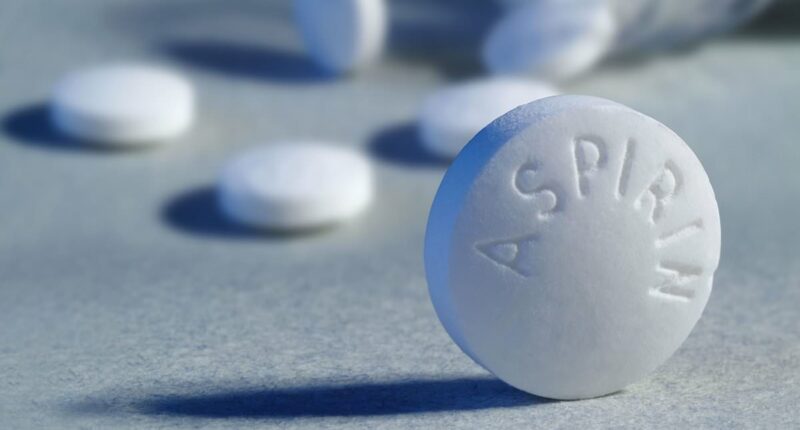Share this @internewscast.com
For years aspirin has been taken by millions because of its heart-protective benefits – but could that be about to change?
Aspirin decreases blood ‘stickiness’, thereby reducing the likelihood of clots that impede blood flow to the heart and brain. However, a significant study suggests that many individuals might gain from transitioning to an alternative medication—clopidogrel. New research published in the Lancet indicates that it is more effective.
This discovery could have extensive consequences. In England especially, general practitioners provide approximately 1.6 million aspirin prescriptions each month, mainly in low doses of 75mg daily, dubbed ‘baby’ aspirin, to those with elevated heart attack and stroke risks.
So should you ask your GP to switch you to clopidogrel? Here we explain everything you need to know.
What did the new study show?
The study demonstrated that individuals on clopidogrel had a 14 percent lower chance of experiencing life-threatening heart attacks or strokes over a two to three-year period compared to those taking aspirin.
Moreover, both medications increase the risk of gastric bleeding due to damaging the stomach lining, but earlier studies implied clopidogrel (known by brands such as Plavix and Grepid) posed a greater risk, discouraging many doctors from prescribing it.
However, researchers from the UK, US, Australia, Switzerland, and Japan analyzed data from seven past trials involving 29,000 heart disease patients and determined there was minimal difference between the drugs, with 256 suffering significant bleeding on clopidogrel compared to 279 on aspirin.
How do the drugs work?
Aspirin blocks COX enzymes, which play a major role in blood clotting, pain and fever.

In England alone, GPs issue around 1.6 million aspirin prescriptions every month, primarily in low doses of 75mg a day known as ‘baby’ aspirin, to patients at increased risk of heart attacks and strokes.

Clopidogrel is an antiplatelet medicine. It prevents platelets (a type of blood cell) from sticking together and forming a dangerous blood clot

Professor Leyva-Leon, a cardiologist at Queen Elizabeth Hospital, Birmingham, says occasional use of either drug for headaches or short-term pain relief is unlikely to cause a problem
This reduces the release of platelets, fragments in blood that clump together to stop bleeding but that can also turn into life-threatening clots that block blood supply to the heart or brain. Clopidogrel binds to and effectively blocks the action of a molecule called adenosine diphosphate, which causes platelets to stick together to form a clot.
Under UK guidelines, baby aspirin is given to those who’ve had a heart attack or stroke and clopidogrel is to be used if aspirin is not suitable, such as in patients with an aspirin allergy, which affects up to 2 per cent of the population and can trigger symptoms such as skin reactions, nasal congestion and breathing problems.
Could ‘better’ drug affect my other pills?
If you’re taking clopidogrel, the NHS advises steering clear of the higher dose (300mg) aspirin given for pain relief as this could significantly increase the risk of a dangerous gastric bleed. Ibuprofen carries the same risk.
However, Professor Leyva-Leon, a cardiologist at Queen Elizabeth Hospital, Birmingham, says occasional use of either drug for headaches or short-term pain relief is unlikely to cause a problem.
‘But if you take them long-term for painful conditions such as osteoarthritis, then your doctor might consider switching you to a different painkiller that does not raise the risk of gastric bleeding.’
And if you’re taking clopidogrel the NHS website also recommends avoiding certain indigestion medicines – such as omeprazole (brand name Losec) or esomeprazole (brand name Nexium). These block an enzyme which converts clopidogrel into its active form, making it less effective.
Can juice really stop it working?
There’s no risk with aspirin but grapefruit juice ‘disarms’ an enzyme which clopidogrel needs to work as an anti-clotting agent. Research shows that when the drug is taken at the same time as grapefruit juice it is only half as effective at blocking platelet formation than when the drug is taken with water.
The NHS also warns against taking certain herbal remedies, such as the depression treatment St. John’s Wort, with either aspirin or clopidogrel, due to a bleeding risk.
Should I ask my GP to switch to clopidogrel?
‘No, not yet,’ says Professor Naveed Sattar, a cardiologist at Glasgow University’s Institute of Cardiovascular and Medical Sciences.
‘The increased benefit from taking clopidogrel is considerable but we need to look at the evidence more closely and weigh up the big factor – which is cost.’
Aspirin costs around 2p a tablet and clopidogrel roughly 80p so the added financial burden to the NHS from switching patients over could be considerable.













